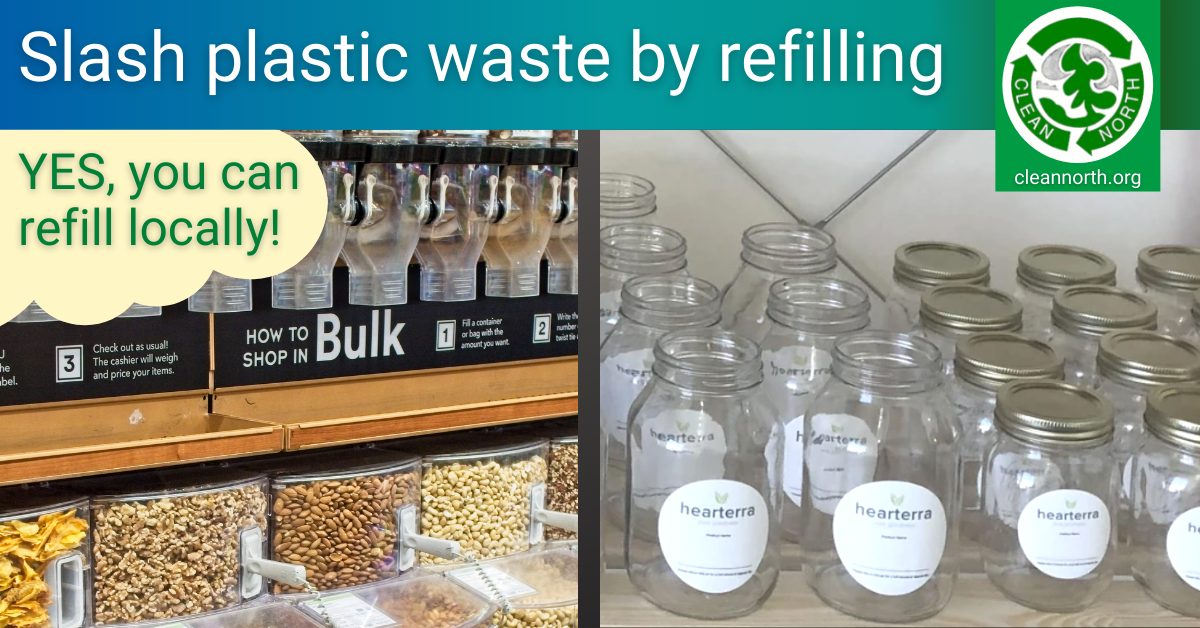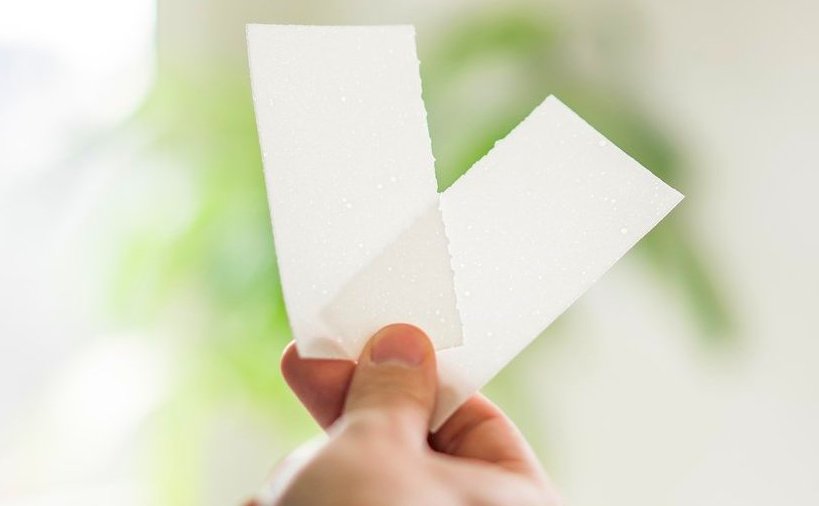
By guest writer Abbi Johnston
Do you ever wonder how to reduce your disposable plastic use? So many things we purchase come in plastic packaging —from powdered sugar to peanut butter to shampoo to window cleaner. For many of these products, there isn’t an option to buy them in a reusable, recyclable, or compostable package. So we end up sending more and more plastic to the landfill.
As people work to creatively solve this problem, more environmentally friendly options are becoming available. One of these options is to refill instead of purchasing more and more items encased in plastic.
Bulk Barn’s reusable container program
Let’s start by exploring the reusable container program at Bulk Barn. This store across from Cambrian Mall carries everyday cooking and baking items like pasta, soup mixes, sugar, flour, and nut butters, as well as treats like snack mixes, cookies, and candy. If you look in your cupboards, I think you’ll find that many of the items you’re buying in plastic packaging could instead be brought home in a reusable container. So how does this program work?
- Select approved containers:
- Acceptable options include plastic, glass, metal, ceramic, or cloth that is clean and in good condition (no chips, cracks, stains, debris, dirt, or residual food).
- Containers must be sealable with either a lid, drawstring, or clip-closure.
- *Paper or plastic bags are not acceptable for reuse*.
- Bring your containers to the cashier to be weighed before you start shopping (so you aren’t charged for the weight of your container, only what you put inside).
- Fill up your containers with all of your grocery needs.
- Return to the register with your filled containers to be charged for what you’ve selected.
That’s it! This simple program makes it easy to reduce your disposable plastic consumption when it comes to food. Visit Bulk Barn’s website for more information.
Hearterra: The Sault’s new refillery
Pivoting away from grocery, you’ll also notice that many of the household beauty and cleaning items you purchase come in plastic containers. Unfortunately, the vast majority of these cannot be recycled (many are #5 plastics). Hearterra, a local company located at 73 Brock St., endeavours to provide household goods without excess waste. They stock a variety of household cleaning and personal care products sold in refillable containers. Currently, they offer online sales and curbside pickup until their storefront opens October 16. So, how does it work?
- Visit their website and select the products you’re interested in purchasing
- Choose the packaging you’d like your product placed in
- Check your email for when your order is ready to pickup
- Refill your containers at home using the product you purchased or keep the container you purchased from them
- Return purchased containers for a full refund
Coming soon…refilling at OC Beauty!
OC Beauty is another retailer that will soon have a refilling option for beauty/body products. They paused this service due to the pandemic but plan to have refilling up and running again soon! Check out their website to learn more about the products they offer and to see when refilling is once again available.
Online options
Many online retailers are finding ways to eliminate plastic packaging while also lessening the environmental impact of shipping things that are mostly water. You could compare their cleaning products to the way fountain drinks are created — a small bit of concentrate is added to water before being used. By letting you add your own water, you can save on shipping (and transportation emissions) and eliminate the need to buy a new bottle each time you run out of cleaner. Some online stores to check out:
- Blueland will send you a concentrated solid puck for household cleaners or hand soap to put into the bottle of your choice. They also have dishwashing and laundry detergent pucks. Their products are shipped in compostable paper so no plastic waste.
- HopePodz from Planet Hope sells concentrated liquid cleaners in a biodegradable pouch to put into the bottle of your choice. Their products are shipped in cardboard.
- OneTab has solid cleaning pucks to drop into the bottle of your choice, as well as pucks for the dishwasher and laundry machine.
Do your homework

When buying products marketed as eco-friendly, do your homework and know all the pros and cons. Some questions to research when deciding on refilling products:
- What are the ingredients? Find out what’s in products you’re considering buying and make sure you are ok with all the ingredients. For example, cleaner pods, tabs, and strips may contain synthetic ingredients like polyvinyl alcohols (PVAs). These particles appear not to degrade as promised and may pose a risk to aquatic ecosystems. You may decide products with PVAs are worth it because it’s a lot less plastic, or you may keep looking for a totally natural product. Just make an informed decision.
- How is it packaged? Some “green” products sold online come with some plastic packaging. Again, it’s up to you to balance the tradeoffs.
When it comes to refilling…ask
Some auto repair shops will refill windshield wiper fluid jugs. Fountain Tire here in the Sault is one such shop. Some coffee shops refill, but you have to go inside rather than through the drive-through. As you go about your day, consider what other products might be refillable rather than buying the product in a new container. It never hurts to ask, and if stores get enough requests, they might start offering refilling.
Or make your own refills
MANY websites have recipes for making your own cleaners and beauty products. But be careful — choose a reputable site and confirm ingredients are safe. Vinegar, for example, is acidic and can damage granite, marble, and wood. And while many green cleaning recipes call for borax, there are some safety concerns. Here is one article on what to know before you DIY cleaners.
Bottom line, it can be challenging trying to balance the trade offs when it comes to refilling products — price, ease of access, shipping weight/size, amount of plastic involved. Do your homework, ask lots of questions, and draw up a list of pros and cons before you invest too heavily in a given option.
And consider shopping local. A healthy small business sector is important to sustainability.
It’s exciting that more companies are finding ways to minimize plastic, which means we can also reduce ours! Hopefully the information presented here will inspire you to join the refilling revolution.




